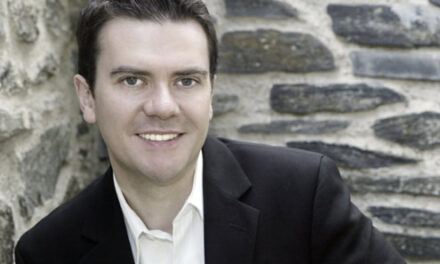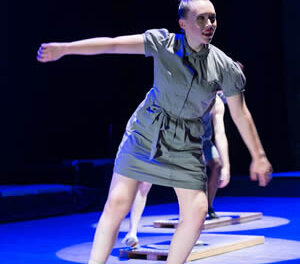It was unseasonably warm, making it a perfect night out. Duke University’s Bone Hall quickly filled with students and fans of contemporary music. Duke New Music Ensemble [dnme] commemorated the centennial of John Cage (1912-1992) with an exciting program of new and nearly new compositions including works by: Cornelius Cardew, D. Edward Davis, Stephen Jaffe, John Cage, Justin Writer, and a mixed media work, Bartleby’s Refrain (2012): music by Jamie Keesecker and Joe Silver and video by Joe Silver and Sarah Goetz.
Tim Hambourger conducted Cornelius Cardew’s 1967 “Material” for an “ensemble of harmony instruments” and performed with two pianos, violin, viola, flute and horn. Cardew (1936-73) who assisted Stockhausen and was inspired by John Cage, is considered one of the foremost British experimental composers of his generation. The ensemble was tight, creating a focused yet colorful sound. It was a fitting choice.
Nature is a recurring theme in John Cage’s work, and likewise in this program. “Jewelweed” (2012) by D. Edward Davis was performed by Jamie Keesecker (percussion) and Heidi Wait (flute). The prolific, very tall plant (impatiens capensis) gets its name from the beautiful beads of water that form on its water-repellent leaves. In correspondence, Davis writes that the parts are notated proportionally to express time. The crotales struck by brushes in combination with the breathy multi-phonics of the flute made for a beautiful sound picture. Inspired by nature, Davis says “it portrays, in sound, the symbiotic relationship between the orange jewelweed and the ruby-throated hummingbird.” His pastel-like composition has staying power; I would love to hear it again.
“Bartleby’s Refrain” for electric guitar, percussion and video was a fascinating contribution to the program. With a surrealist touch, the video and understated music reminded me of a color version of experimental films from early twentieth century. In this case nature was transformed by art. It was mesmerizing.
The centerpiece of the program, John Cage’s “Three2” (1991) was performed by David Kirkland Gardner, Tim Hambourger and Vladimir Smirnov. Gently tapping, stirring, and bowing an assortment of metallic percussion instruments, they created independent lines that serendipitously resonated with moments of harmony. My mind briefly wandered; the altered sense of consciousness an effect of non-hierarchical sounds. The premiere at the Kitchen (NY City, 1991) involved a choreography and dance by Merce Cunningham. I envisioned this, but the music was quite beautiful alone.
Justin Writer’s 2009 composition, B/P + IG (10) (which means Bass, Piano, and Indeterminate Group of Ten Players) is written in three parts, each entitled with “a fanciful, cosmic title” (composer’s words) that set my mind on an equally adventurous visual journey. “The Dark Organic Substance,” for example, begins with a jarring, loud frenzy of sound; eerie, hushed voices follow with pounding piano clusters. Like a Hitchcock film, the surprises made me jump. My favorite was Part III: “The Forbidden Dance of the Ocarinas: The Expanse of Dark Matter.” Notated graphically, the section relies on the ensemble to make artistic decisions. And they did. There was also a bit of Cagean fun in the piece — better left to your imagination.
There was more. The delightful “Movement O: Frog, Pond, Plop” (2012) by Dan Ruccia and words by Christian Bök and was well performed by Molly Hill (mezzo-soprano) and Jung-Min Lee (piano). Movements I and IV from Stephen Jaffe’s String Quartet No. 2: “Aeolian and Sylvan Figures” (2006) was played by Sarah Griffin, Andrew Bonner (violins); Halie Morris (cello); and Dan Ruccia (viola). Jaffe looked pleased with their performance. The full ensemble also included Wenjia Xu (violin).
Now in its fifth year, and under the fine directorship of Tim Hambourger, the Duke New Music Ensemble [dnme] has grown in number and musicianship. These young, dedicated players obviously work hard to play challenging music so convincingly and very importantly, to share it with the listening community. Congratulations to the composers and players. Well done.












